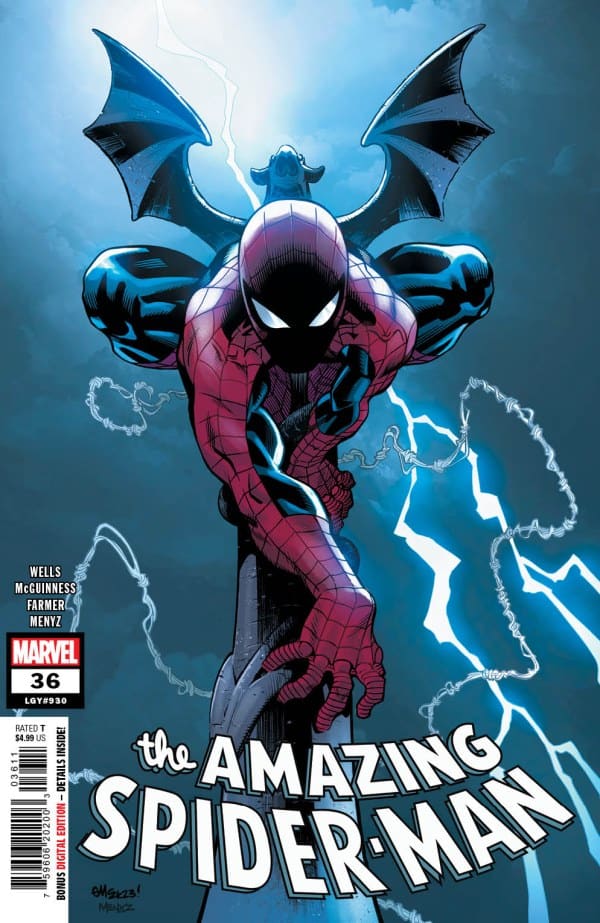The Amazing Spider-Man #36

Recap
Spider-Man has never gone this dark. Now the consequences are unraveled. Will New York ever look at him the same way again?
Review
The Amazing Spider-Man #36, from a technical standpoint, embodies what you might expect from Zeb Wells’ ongoing run with the web-slinger. It displays inconsistency in both tone and plot, with strong dialogue and even stronger comedic timing. At the start of this issue, there’s a noticeable lack of smooth story progression, as readers find Peter in a completely different situation compared to where he was left in #35. This seems to be a recurring issue. As threads are being woven for the upcoming Gang War event, it appears that the title’s problems with disjointed storytelling will persist. For now, we must appreciate the intriguing focus of this new arc, Rek-Rap.
Yes, Rek-Rap, the breakout star of Dark Web, has returned and brings just enough enjoyment to divert readers from the book’s significantly flawed narrative development. Questions arise about the absence of consequences from the previous storyline and the continuation of an underdeveloped status quo for Peter, with little innovation or interest.
But who cares, because Rek-Rap is an absolute treasure. When the story revolves around him, it shines. There’s a mysterious element tied to the supernatural enigma of Madelyn Pryor, and this book excels when it harks back to Wells’ style in Hellions. Ed McGuinness’ art suits this issue, exuding his passion for Rek-Rap through expressive penciling, complemented by coloring and inks that provide visual consistency. The writing of Rek-Rap’s plot is genuinely entertaining, and a reminder as to what Zeb can do when he’s in the zone.
At its lowest, it’s introducing events with one of the most tone-deaf and forced motivations for Peter in this series, which says a lot. As always, it’s another instance where Zeb’s genuine understanding and skill in writing Peter are overshadowed by rushing toward other storylines. During a conversation between Luke Cage and Peter, there’s a moment where Luke criticizes Peter for not doing more as a superhero and not being more involved in superhero-related politics.
I’m all for politics in comics, but what I’m not here for is subpar writing. The reason Peter isn’t focused on grounded, realistic, and relatable problems anymore is because Wells and the editorial team have been reluctant to let him be that character. He’s either grappling with the influence of a magical sin shotgun, battling his suddenly evil clone under the sway of the demonic realm of Limbo, investigating a supernatural mystery alongside his monstrous counterpart from Limbo, or facing off against a Mayan math god that has granted his once entirely relatable ex-partner ‘jackpot’ superpowers.
The reason Peter isn’t ‘doing more’ is because the team’s objective is not to create a relatable, grounded, and focused Spider-Man run. The book is being marketed on shock, gimmicks, and anger. If you want a socially responsible Spider-Man, then it’s time to move away from self-serving fan fiction and return to genuine Spider-Man storytelling. Begin crafting character-driven stories with substance that build upon each other. While political storytelling in Spider-Man isn’t an issue, what is problematic is the elevated pedestal that the editorial team stands on while delivering disjointed, unsatisfying, and forced schlock.
Final Thoughts
It's more of the same from this run at a technical level, and no matter how fun and well-written Rek-Rap is, can't distract from the fact that this series is spiraling down a drain of disjointed and unsubstantiated storytelling that can't focus on a theme, tie up an arc, or tell a story that feels natural.
The Amazing Spider-Man #36: Guess Who’s Back?
- Writing - 6/106/10
- Storyline - 7/107/10
- Art - 7.5/107.5/10
- Color - 7.5/107.5/10
- Cover Art - 7/107/10



